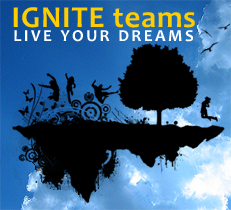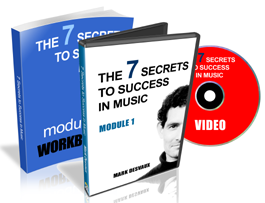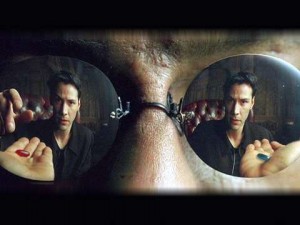 In the film The Matrix there is a defining moment where the lead character Neo is offered either a blue pill or red pill. They have become pop culture terms that represent a common symbol for the choice between the blissful ignorance of illusion (blue) and embracing the sometimes painful truth of reality.
In the film The Matrix there is a defining moment where the lead character Neo is offered either a blue pill or red pill. They have become pop culture terms that represent a common symbol for the choice between the blissful ignorance of illusion (blue) and embracing the sometimes painful truth of reality.
In 1991, I started to read hundreds of books and listened to countless audio on personal development, motivation, life purpose, human potential, mortality, and the fear of death, spirituality, gratitude and happiness. I quickly became struck by how amazing (and amazingly complex) we are as a human race, and also the untapped potential we all have.
In 2005, as part of a documentary I was filming, I started to research themes ranging from the environment and climate change, the money system, peak oil, food security and world population. I read every book I could find, watch every documentary and TV show, attended many seminars, whether a local transition town meeting to a public lecture at Cambridge University.
I was privileged to interview some of the world’s leading experts on these subjects. It became a personal journey of discovery, joining the dots on all these different themes from human potential to environmental disaster. At times it left me wholly confused, and other times totally empowered to make change on the biggest possible scale. Without realising it, I had taken the blue pill. The way I saw the world had changed forever.
Recently a very good friend asked if I could put together a list of the most compelling films I have seen which can be shared with others wishing to also plunge below the superficial level which we typically all swim day-to-day. When most people drive a car, they have no idea how it works. They know which pedals to push and how to turn the wheel. If you want to get from A to B that is all you need to know. If you are one of those people who doesn’t want your life to simply be about the destination, it’s time to take the plunge. What I found through the rollercoaster journey I have been on (so far) is that hiding in amongst the sea of information and knowledge is a potential life purpose – something to dedicate your time, energy and effort to try to make a real difference along your journey.
So where to start? Right here:
DOCUMENTARIES THAT CHANGED THE WORLD
FOOD
FOOD INC
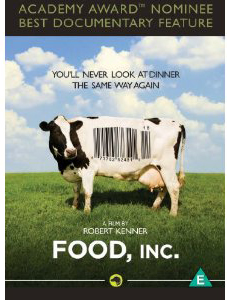 As a young child, like most kids, I might find a sweet on the floor and put it in my mouth, only to hear one of my parents shouting at me to “spit it out – you don’t know where it’s come from!â€
As a young child, like most kids, I might find a sweet on the floor and put it in my mouth, only to hear one of my parents shouting at me to “spit it out – you don’t know where it’s come from!â€
As an adult, I realised I still hadn’t learnt that lesson. Food is a pretty much as fundamental as it gets. It is one of the few things we can all understand, and for me, it is the start of any exploration into the state of our world today.
This 2010 Oscar-nominated documentary, unwraps the cellophane on the food industry and takes you on the journey from seed to plate. It’s compelling, it’s shocking and you’ll come away wanting to grow your own.
An essential film which help me change the way I look at food, and as a result make more informed decisions.
9/10
Synopsis:
Where does the food we purchase really comes from, and what it means for the health of future generations? By exposing the comfortable relationships between business and government, Food Inc gradually shines light on the dark underbelly of the food industry. As chicken breasts get bigger and tomatoes are genetically engineered not to go bad obesity levels are skyrocketing, and adult diabetes has reached epidemic proportions. Perhaps if the general public knew how corporations use exploited laws and subsidies to create powerful monopolies, the outrage would be enough to make us think more carefully about the food we put into our bodies.
THE END OF THE LINE
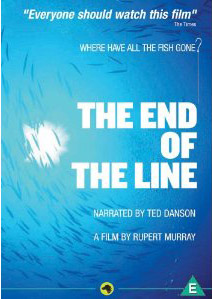 It easy for us to see how the world has changed as we go about our daily business, but when it comes to the sea, it is something we can remain largely ignorant about, unless you live in a fishing port. For me, The End of the Line is not only a brilliant insight into the fishing crisis, but also essential viewing along with the other films listed here to demonstrate just how everything in our world is connected.
It easy for us to see how the world has changed as we go about our daily business, but when it comes to the sea, it is something we can remain largely ignorant about, unless you live in a fishing port. For me, The End of the Line is not only a brilliant insight into the fishing crisis, but also essential viewing along with the other films listed here to demonstrate just how everything in our world is connected.
8/10
Synopsis:
As the world’s demand for fish and other seafood increases and the technology available to commercial fisherman becomes more sophisticated, the annual harvest from global seaports has grown tremendously in recent years. However, the rise of industrialised fishing has not come without consequences, and many environmentalists and oceanographers believe that the current demand for fish and the methods used to fulfil it are taking an irreparable toll on the world’s oceans, with some speculating that the seas could be literally fished-out by 2048 if current trends do not change. Filmmaker Rupert Murray offers an in-depth look at the crisis in the world’s oceans in the documentary THE END OF THE LINE, in which experts discuss some of the key factors behind the looming shortage — increased demand for endangered species, irresponsible methods employed by major fishing lines, lax enforcement of current regulations — and what can be done to head off the famine before it’s too late.
THE VANISHING OF THE BEES
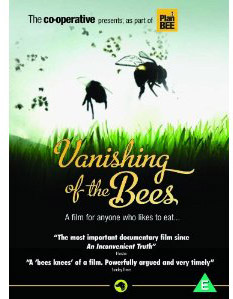 Think of bees and food and you instantly think ‘honey’. Think again. Did you know bees are responsible for pollinating 80% of all food plants? There is a crisis with the bee population which has declined dramatically in the last sixty years.  We owe a lot to bees because without their hard work  we could say goodbye to apples, almonds, blueberries, peppers, pumpkins, avocados, cucumbers, kiwis, broccoli, alfalfa, cotton, citrus, soya beans, onions, broccoli, carrots, sunflowers, melons, cherries – the list goes on. We would be left with wheat, rice, corn and maybe pineapples and bananas. If bees disappear, most fruits, vegetables, and flowers would disappear with them.
Think of bees and food and you instantly think ‘honey’. Think again. Did you know bees are responsible for pollinating 80% of all food plants? There is a crisis with the bee population which has declined dramatically in the last sixty years.  We owe a lot to bees because without their hard work  we could say goodbye to apples, almonds, blueberries, peppers, pumpkins, avocados, cucumbers, kiwis, broccoli, alfalfa, cotton, citrus, soya beans, onions, broccoli, carrots, sunflowers, melons, cherries – the list goes on. We would be left with wheat, rice, corn and maybe pineapples and bananas. If bees disappear, most fruits, vegetables, and flowers would disappear with them.
This documentary was one of the reasons I took up beekeeping. Talk to most beekeepers and it’s all about how much honey they get each year from their colonies. I discovered that through caring for a colony of 80,000 bees, I get a privileged, fascinating and unique window into our world and our environment. Their collective intelligence is beyond our understanding.  I don’t like to think of myself as a bee ‘keeper’, but a bee guardian. They are not mine to keep, but an essential part of our ecosystem and something we should care for if we care to have food on our tables each day.
9/10
Synopsis:
This documentary takes a piercing investigative look at the economic, political and ecological implications of the worldwide disappearance of the honeybee. The film examines our current agricultural landscape and celebrates the ancient and sacred connection between man and the honeybee. The story highlights the positive changes that have resulted due to the tragic phenomenon known as “Colony Collapse Disorder.” To empower the audience, the documentary provides viewers with tangible solutions they can apply to their everyday lives. Vanishing of the Bees unfolds as a dramatic tale of science and mystery, illuminating this extraordinary crisis and its greater meaning about the relationship between humankind and Mother Earth. The bees have a message – but will we listen?
A FARM FOR THE FUTURE
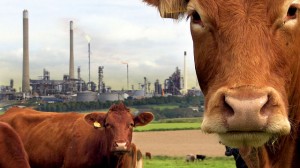 You don’t need to have an interest in farms or farming to get this documentary. It’s about what you do three times a day. Originally aired on the BBC (with clips on the internet if you search) this documentary quietly opens the eyes of all who see it, by telling the personal story of a Rebecca Hosking returning to take over the family farm from her aging father. She investigates the stark problems and reality of our current mass agricultural system and how that will effect our food system and food security in the future. There is a stunning moment of  footage of tractors and birds from two eras to demonstrate how our soil is dying. That scene will live with me forever.
You don’t need to have an interest in farms or farming to get this documentary. It’s about what you do three times a day. Originally aired on the BBC (with clips on the internet if you search) this documentary quietly opens the eyes of all who see it, by telling the personal story of a Rebecca Hosking returning to take over the family farm from her aging father. She investigates the stark problems and reality of our current mass agricultural system and how that will effect our food system and food security in the future. There is a stunning moment of  footage of tractors and birds from two eras to demonstrate how our soil is dying. That scene will live with me forever.
9/10
Synopsis:
Wildlife film maker Rebecca Hosking investigates how to transform her family’s farm in Devon into a low energy farm for the future, and discovers that nature holds the key.
With her father close to retirement, Rebecca returns to her family’s wildlife-friendly farm in Devon, to become the next generation to farm the land. But last year’s high fuel prices were a wake-up call for Rebecca. Realising that all food production in the UK is completely dependent on abundant cheap fossil fuel, particularly oil, she sets out to discover just how secure this oil supply is.
Alarmed by the answers, she explores ways of farming without using fossil fuel. With the help of pioneering farmers and growers, Rebecca learns that it is actually nature that holds the key to farming in a low-energy future.
WATER
BLUE GOLD
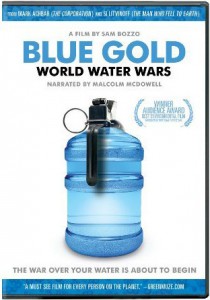 Turning the tap off when you brush your teeth might help save water, but watch this documentary and you’ll start to really appreciate why water is our planet’s most precious resource. As our thirst grows, we already know this to be true, but in countries where we don’t have to walk ten miles a day to fill up a bucket, it is easy to become complacent about the global fresh water supply which we depend on for our survival. I was really taken aback by the section on fresh cut flowers from Kenya, and the idea of the “embodied” water in everything we import, especially from countries that have a scarce water supply. My new mantra: If it’s yellow, let it mellow. Essential viewing.
Turning the tap off when you brush your teeth might help save water, but watch this documentary and you’ll start to really appreciate why water is our planet’s most precious resource. As our thirst grows, we already know this to be true, but in countries where we don’t have to walk ten miles a day to fill up a bucket, it is easy to become complacent about the global fresh water supply which we depend on for our survival. I was really taken aback by the section on fresh cut flowers from Kenya, and the idea of the “embodied” water in everything we import, especially from countries that have a scarce water supply. My new mantra: If it’s yellow, let it mellow. Essential viewing.
9/10
Synopsis:
Wars of the future will be fought over water as they are over oil today, as the source of human survival enters the global marketplace and political arena. Corporate giants, private investors, and corrupt governments vie for control of our dwindling supply, prompting protests, lawsuits, and revolutions from citizens fighting for the right to survive. Past civilizations have collapsed from poor water management. Can the human race survive?
OUR WORLD
THE 11th HOUR
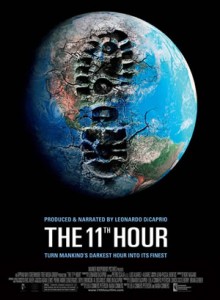 An excellent global view on what is happening in our world today. It’s hard hitting with many memorable contributors and quotes. The main film itself is quite problem-focused and can be an uncomfortable watch when you realise you are part of the cast. Don’t miss the edition of the DVD with a bonus disc which I highly recommend. I spoke with one of the contributors who didn’t even realise he was one it! Disc 2 is more inspiring and solutions-focused than the main feature and a good antidote to the chilling main feature.
An excellent global view on what is happening in our world today. It’s hard hitting with many memorable contributors and quotes. The main film itself is quite problem-focused and can be an uncomfortable watch when you realise you are part of the cast. Don’t miss the edition of the DVD with a bonus disc which I highly recommend. I spoke with one of the contributors who didn’t even realise he was one it! Disc 2 is more inspiring and solutions-focused than the main feature and a good antidote to the chilling main feature.
9/10
Synopsis:
Leonardo DiCaprio presents this thought-provoking documentary about the fragile state of our planet’s ecosystems and the dangers we face. We’ve all seen the devastating effects of natural disasters like Hurricane Katrina, and now scientists and experts from around the world believe that unless we act immediately to cut carbon emissions and switch to renewable energy sources, humankind is in very real danger of becoming extinct. The film explores how we arrived at this unfortunate predicament, blaming industrial civilisation for much of the damage and world leaders for allowing it to happen. It’s not all doom and gloom though; if we reduce the human footprint on Earth by a wide enough margin, we can effectively change the course of our planet’s future. THE 11TH HOUR gathers an impressive list of supporters, including former Soviet leader Mikhail Gorbachev, renowned scientist Stephen Hawking, former head of the CIA R. James Woolsey, and over 50 leading scientists.
AN INCONVENIENT TRUTH
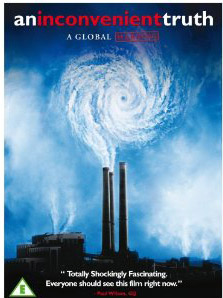 A list of documentaries that changed the world would be incomplete with the granddaddy of them all. It’s inclusion is more due to the impact it had on bringing environmental issues into the mainstream rather than it’s “Top 10” list of changing light bulbs.
A list of documentaries that changed the world would be incomplete with the granddaddy of them all. It’s inclusion is more due to the impact it had on bringing environmental issues into the mainstream rather than it’s “Top 10” list of changing light bulbs.
8/10
Synopsis: Former vice president Al Gore shares his concerns on the pressing issue of global warming in this documentary. A long-time environmental activist, Gore first became aware of evidence on global warming in the 1970s, and since leaving public office he has become a passionate advocate for large- and small-scale changes in our laws and lifestyles that could help alleviate this crisis. An Inconvenient Truth records a multi-media presentation hosted by Gore in which he discusses the scientific facts behind global warming, explains how it has already begun to affect our environment, talks about the disastrous consequences if the world’s governments and citizens do not act, and shares what each individual can do to help protect the Earth for this and future generations.
THE WAY WE LIVE (OIL)
THE END OF SUBURBIA
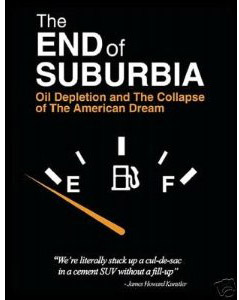 Don’t be fooled. This is not a film about oil. It’s a film about the society we have created in the industrial age, and why it is not sustainable for the future. A film whose central theme is oil is unlikely to break box office records, but The End of Suburbia has become a defining film of its generation for many, including the founder of Transition Town, Rob Hopkins. Even though it has an American focus, it is relevant to all modern societies.
Don’t be fooled. This is not a film about oil. It’s a film about the society we have created in the industrial age, and why it is not sustainable for the future. A film whose central theme is oil is unlikely to break box office records, but The End of Suburbia has become a defining film of its generation for many, including the founder of Transition Town, Rob Hopkins. Even though it has an American focus, it is relevant to all modern societies.
If ever there was a blue pill, this is it. This film will whip off your rose-tinted spectacles and you may never see the world in the same way again.
8/10
Synopsis:
Since the end of World War II, American families have steadily moved away from large cities into suburban areas, with little thought to the ecological costs of suburban life. Creating neighborhoods with large single-family homes that require significant amounts of energy to heat and are located an inconvenient distance from schools, shopping centers, and employment districts that demand the daily use of automobiles, suburbs are remarkably inefficient communities built around the notion that fossil fuels will always be inexpensive and readily available. However, many experts have speculated that the Earth’s supply of oil and natural gas is rapidly dwindling, and that the amount available may throw the world into a global, political, and economic crisis in the foreseeable future. The End of Suburbia: Oil Depletion and the Collapse of the American Dream is a documentary which examines the rise of the suburban lifestyle, the costs to the Earth and the economy of our current living habits, where we may be headed, and how this situation can be remedied.
A CRUDE AWAKENING
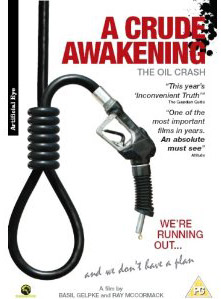 To some this film is a poorer cousin to The End of Suburbia, but it does help to broaden understanding on the issue of ‘Peak Oil’ someting which is gathering mainstream recognition. As complex as it might seem, Peak Oil is a concept we all need to grasp. I felt quite disturbed after watching this. You can be left feeling quite helpless at the potential scale of the issue facing us, but the bottom line is change can only happen if each one of us have the knowledge, motivation and a reason to change.
To some this film is a poorer cousin to The End of Suburbia, but it does help to broaden understanding on the issue of ‘Peak Oil’ someting which is gathering mainstream recognition. As complex as it might seem, Peak Oil is a concept we all need to grasp. I felt quite disturbed after watching this. You can be left feeling quite helpless at the potential scale of the issue facing us, but the bottom line is change can only happen if each one of us have the knowledge, motivation and a reason to change.
6/10
Synopsis:
Filmmakers Basil Gelpke and Ray McCormack team up to deliver a grave warning in this documentary on the oil industry. Gelpke and McCormack are firm believers that the world’s oil resources are in dangerously short supply, and that the price of oil is about to rise to previously unthinkable levels. The film also offers some possible solutions to the oil crisis by looking at alternative energy sources.
THE POWER OF COMMUNITY
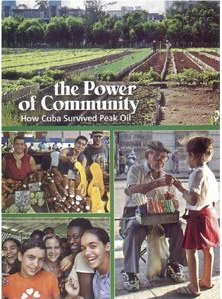 Finally an  inspiring film! A real-life look at how Cuba survived without oil. This film won’t win any awards for cinematography, but its beauty  is shown in how local communities all pull together to work together when faced with a deep crisis. As urban societies have grown, there has been a decline in community (what are your neighbours names?), but this film shows how the human spirit can be reignited to give us all hope for the future.
Finally an  inspiring film! A real-life look at how Cuba survived without oil. This film won’t win any awards for cinematography, but its beauty  is shown in how local communities all pull together to work together when faced with a deep crisis. As urban societies have grown, there has been a decline in community (what are your neighbours names?), but this film shows how the human spirit can be reignited to give us all hope for the future.
7/10
Synopsis:
When the Soviet Union collapsed in 1990, Cuba’s economy went into a tailspin. With imports of oil cut by more than half and food imports cut by 80 percent, people were desperate. This fascinating and empowering film shows how communities pulled together, created solutions, and ultimately thrived in spite of their decreased dependence on imported energy. In the context of global Peak Oil worries, Cuba is an inspiring vision of hope.
BUSINESS & GROWTH
THE CORPORATION
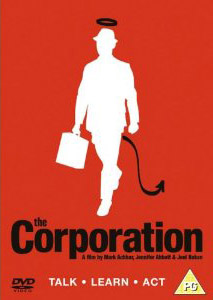 At face value, a documentary about global business is probably not most people’s cup of tea. However, this is an extremely compelling account which taught me so much about why our modern world is the way it is. As someone who worked in a corporation for five years and headed up large teams, I was blown away by how little I really understood about the mechanics of what a corporation really was, and more importantly, how it affects the world we live.
At face value, a documentary about global business is probably not most people’s cup of tea. However, this is an extremely compelling account which taught me so much about why our modern world is the way it is. As someone who worked in a corporation for five years and headed up large teams, I was blown away by how little I really understood about the mechanics of what a corporation really was, and more importantly, how it affects the world we live.
It covers so much in such a short period of time that you’ll come away with your head spinning, and want to watch it again to deepen you understanding.
8/10
Synopsis:
THE CORPORATION is a well-organised and deeply fascinating documentary about the growing prominence of large global businesses, and the way that their decisions are impacting the world. The film shows how corporations have ballooned in size and power since the industrial revolution, and explains the laws and loopholes that allow them to remain nearly unaccountable for their actions. If they break a law, they are willing to admit guilt and pay the fine, because the profits outweigh the penalties. Therefore, they continue to cause serious environmental problems by dumping waste into rivers and oceans and by depleting natural resources, resulting in irreversible damage to the earth which also poses a serious threat to human life.
What other documentaries have changed your world?



